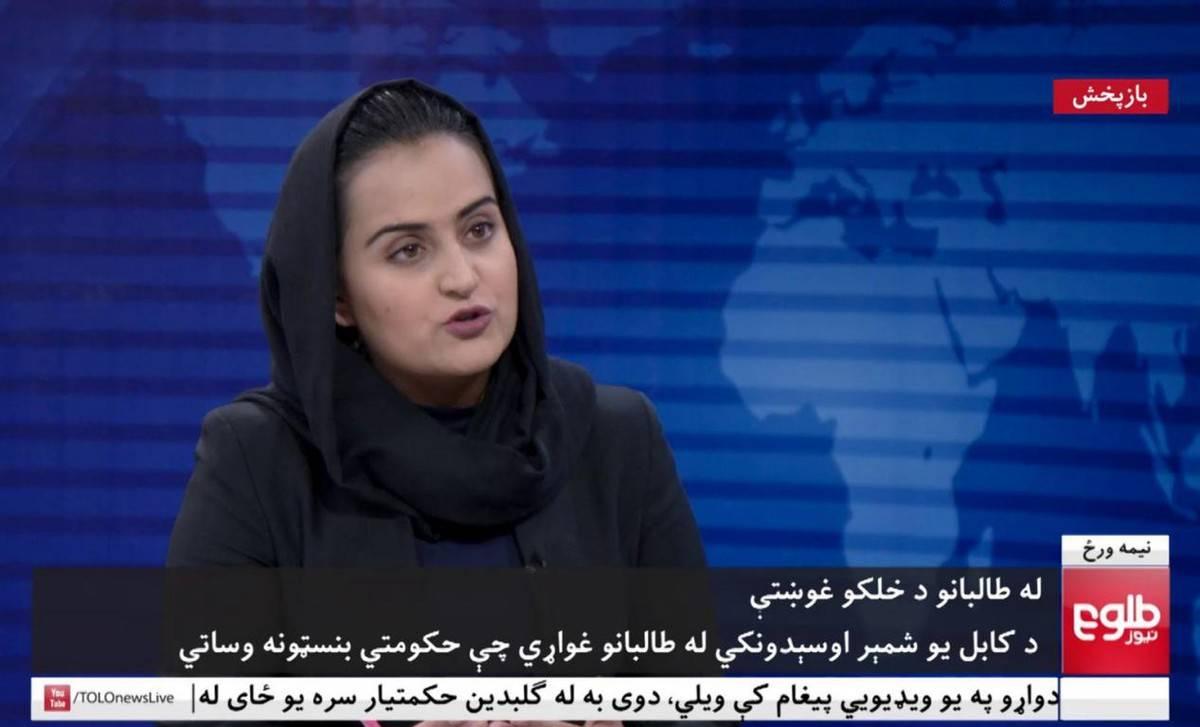Cheng Jing, a journalist from the Oriental Network
According to foreign media reports, the Afghan female journalist Bekhshida Alhand, who was the first Afghan female journalist to interview a Taliban spokesman on live television after entering Kabul, recently ended her work on television and left Afghanistan.

(Pictured: Bekhsta Alhand interviews a Taliban spokesman on the show.) Figure/TOLO)
On August 17, two days after the Taliban occupied Kabul, the Afghan capital, Tolo invited Taliban spokesman Maurawi Hemad into the studio, where 24-year-old Bekhshida was interviewed as the host about the current situation in Kabul, the Taliban's plans for taking power in Afghanistan, and so on.
Dawn News said that after the Taliban entered Kabul on the 15th, for security reasons, the tv station let all female reporters go home and stand by. But two days later, many employees volunteered to return to work and conduct interviews and reports on the streets as usual.
The last time the Taliban came to power, from 1996 to 2001, was one of the worst periods of oppression of women in modern Afghan history, where women were not allowed to receive education, work, and leave the home without the company of male relatives. Analysts believe that the Taliban spokesman's interview with Bekhsta is to show that his stance on women is more liberal and moderate than it was more than 20 years ago.
Bekhsta Alhand's blockbuster interview garnered worldwide attention. Two days later, Bekhsta interviewed Pakistani women's rights activist Malala Yusufzai on the show. Born in the Pashtun tribal region of northwestern Pakistan, Malala was assassinated by the Pakistani Taliban for openly advocating for girls' right to education, and once fell into a coma due to brain damage, winning the Nobel Peace Prize in 2014. The connection with Behshida was also Malala's first interview with Afghan television.
But after two historic interviews, Bekhsta chose to leave Afghanistan, where she and her family have now arrived in the small Gulf state with Qatar's withdrawal flight. In an interview with CNN, Bekhsta said she left for the same reasons as millions of other Afghans — "I'm afraid of the Taliban." ”
Bechsta's ideas are not unique. Saad Mohseni, head of her former employer, Dawn News, said most of the station's prominent hosts and journalists had left Afghanistan and were recruiting new people "like crazy" due to a shortage of manpower. "A lot of people feel that [Afghanistan] is not safe, and we have to allow them to leave while keeping the TV station running, and it's really hard to put the two things together." Saad said.
Bekhsta is 24 years old. In an interview, she said that when she was in the ninth grade, her teacher had asked her to come to the podium to "read the news like a news anchor," and she dreamed of becoming a journalist ever since.
After graduating from high school, Bekhsta entered Kabul University to study journalism, and after a short-term job at several news organizations and radio stations, he joined the "Dawn" news station, and began to serve as a host this year. Before the Taliban came, Bekhsta said, she had been on the job for only a month and 20 days.
Bekhsta said it was "difficult" to interview a Taliban spokesperson, but she did it for Afghan women. "I told myself that we had to take the first step. If we (women) stay at home and don't dare to go out, then the Taliban will think that it is the women themselves who do not want to work. ”
On her way back to her office, she said, Bekhsta was stopped by Taliban militants who asked her why she was "going out alone without a man," which made her feel bad.
But after the interview aired, Bekhsta's Dawn news station was constantly attacked by Taliban supporters.
Two days after connecting with Malala, Behshida began to ask for help. Last Tuesday (24th), Bekhsta and his family boarded a flight to withdraw troops from Qatar and left Afghanistan. Bekhsta said she hopes to come back one day, "If the Taliban do what they promised and things get better and I'm safe, I'll go back to Afghanistan and work for the Afghan people." ”
"Dawn" news station leader, Australian Afghan businessman Mohseni believes that at this stage the Taliban are taking an "unusual" approach to respond to the governments and media that pay close attention to the situation in Afghanistan, "For the Taliban, it is very important at this stage to win the 'people's hearts' and trust, show their legitimacy and ability to cooperate, so the current Afghan has a freer media environment than in the past."
(Pictured: Afghan women gathered outside the presidential palace on the 17th to demand that the new government grant women normal rights and interests.) Photo: Anadolu Agency/Getty Images)
Afghan society has changed dramatically over the past 20 years: during the last Taliban administration, television and the Internet were banned by the Taliban for "spreading immoral content," music was outlawed, there was only one religious radio station in the country, and commercial mobile Internet was not yet widespread.
In today's Afghanistan, where everyone has a smartphone that can record video and audio at any time and can spread rapidly through 4G networks through major cities across the country; social media is so popular that there are dozens of independent television and radio channels in the country; nearly half of the population is not yet 20 years old, born in the post-INVASION era of the United States, and has become accustomed to a relatively open social atmosphere.
This may lead the Taliban to adopt a new strategy towards the media and the public. On the day the Taliban entered Kabul, images of armed men entering the Afghan presidential palace were broadcast live by Al Jazeera to a global audience. After that, the Taliban also gave interviews to female hosts at the BBC and Sky News.